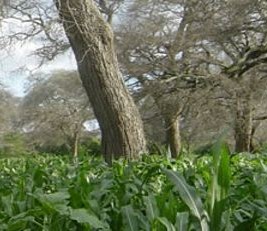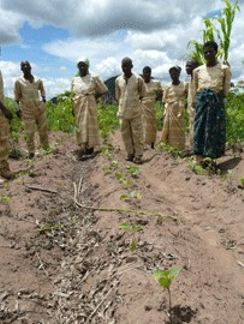|
Malawi | Zambia Agriculture - Nutrition | Science - Education "Fertilizer tree" triples Malawi, Zambia yields
Scientists from the World Agroforestry Centre now call for a scaling-up of the use of so-called "fertilizer trees" in fields throughout Africa to fight climate change and increase food security.
For example, farmers in Malawi had increased their maize yields by up to 280 percent when the crop is grown under a canopy of one particular fertilizing tree, Faidherbia albida. Unlike most other trees, Faidherbia sheds its leaves during the early rainy season and remains dormant during the crop-growing period. This makes it highly compatible with food crops because it does not compete with them for water, nutrients, or light - only the bare branches of the tree's canopy spread overhead while crops of maize, sorghum, or millets grow to maturity below. The leaves and pods were also found to "provide a crucial source of fodder in the dry season for livestock when nearly all other plants have dried up." The trees may continue to provide these cost-free benefits for up to 70 or 100 years. In Niger, there are now more than 4.8 million hectares of millet and sorghum being grown in agroforests that have up to 160 Faidherbia trees on each hectare. According to the World Agroforestry Centre, a broad alliance is now emerging of African governments, research institutions, and international and local development partners committed to expanding evergreen agriculture and agroforestry. "We are already working with 18 countries across the African continent to develop national plans for the accelerated implementation of evergreen agriculture," Dr Garrity explained. The next step was to further refine and adapt the technologies to a wider range of smallholder farming systems in diverse agricultural environments, so that millions more farmers can benefit now and for generations to come from such sustainable solutions to their food production challenges. "Evergreen agriculture allows us to glimpse a future of more environmentally-sound farming where much of our annual food crop production occurs under a full canopy of trees," concludes Mr Garrity. By staff writer © afrol News - Create an e-mail alert for Malawi news - Create an e-mail alert for Zambia news - Create an e-mail alert for Agriculture - Nutrition news - Create an e-mail alert for Science - Education news
On the Afrol News front page now
|
front page
| news
| countries
| archive
| currencies
| news alerts login
| about afrol News
| contact
| advertise
| español
©
afrol News.
Reproducing or buying afrol News' articles.
You can contact us at mail@afrol.com









